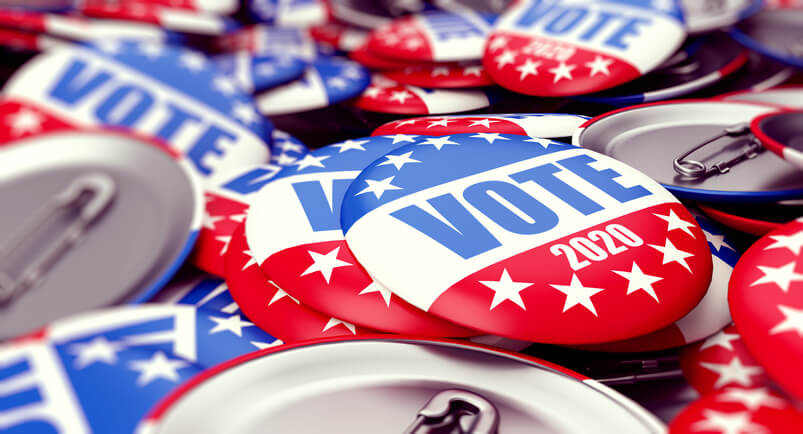I am writing today on a difficult subject—American politics. I think it’s important to prepare our community for an election that has the potential to not only divide our community, but also our nation. As the leader of our school community, I feel a responsibility to our students, so I write simply to remind us adults to keep our focus on what is in their best interest in a complicated time.
While—in age-appropriate ways—we want to expose our students to the complexities of the “real” world, we do not want to see our community become divided over electoral politics. Colorado Academy is a community that is built on shared values. I’ve been here 13 years, and, in every talk I give to new or prospective families, I discuss our commitment to developing critical thinking in our students, to fostering a culture of inclusivity and respect for all, to encouraging listening and dialogue, and to promoting kindness and courage. We have an obligation to use this moment to help students better understand the American experience, but do so in appropriate and responsible ways.
As an educator with a doctorate in American History and as a teacher with more than 20 years of classroom experience, I love sharing my perspectives on American politics. But, like so many in this moment, I have found that politics is no longer really a casual conversation. When teaching, I strongly believe it is my job to avoid telling students what to think, but rather share historical evidence, different historical interpretations, and multiple perspectives.
In graduate school at Vanderbilt University, I took classes from the great intellectual and political historian Paul Conklin. In the 1990s, Conklin gave a talk about Bill Clinton and was asked by another student, “How will history judge Clinton?” Conklin’s response was illuminating: “History doesn’t judge. Historians do.” Essentially, the practice of history is one of interpretation. All of us bring our own biases into that process. I constantly reflect on my biases and try to look at other perspectives. The echo chamber of social media and cable news makes it important to change the channel and go to different news feeds to gather different perspectives.
Serving as role models
I would like our community to be mindful of how we treat one another, as we live through the days and weeks after the election. I ask that we remember we are role models for young people. In the age of COVID-19, our students have enough anxiety in their lives. Can we protect them from more stress and uncertainty? Probably not completely, but I think it best to model a calm, measured approach as our nation grapples with uncertainty and conflict.
It’s safer for many schools to not engage on these issues. But, I think we have an opportunity—in a nonpartisan way—to guide our students through these issues and this historic moment. Because of the extraordinary conflict around this election, we are not engaging in some activities we have typically done, like a student mock election. Naturally, our civics and social studies courses have engaged in some conversations and lessons. But, the goal, as in any classroom setting, is to do so in a way in which an adult is guiding the conversation, encouraging different voices.
On the day after the election (after school), we will likely hold virtual Zoom gatherings (optional, of course) for Middle and Upper School students who want to talk through the situation. We did this in 2016 with liberal and conservative students coming together, along with students who were just curious and wanted to talk about what they were seeing and hearing. These discussions will be guided appropriately by teachers. Our students will want to talk, ask questions, and process. We want to guide their intellectual curiosity and help them better understand how our democratic process works.
It is inevitable in this time that people might see CA as acting politically. I assure you that we are not. We are preparing students for college and beyond. CA’s mission is to help students become independent thinkers. We are here to guide them to better understand their own thinking, not create ideologues. Sometimes we will challenge our students (just as our students will challenge their teachers) with facts, ideas, concepts, and arguments that don’t fit neatly into their world view. That is what school is really all about. I remember I had a professor who urged me “to argue” with the books we were reading. Academia is about engaging others. And, I know we can do that thoughtfully and respectfully.
Becoming the model
One of the most important and influential Americans of the 20th century was George Marshall. He guided America through WWII as the Chief of Staff of the Army. He then went on to serve as Secretary of State and Secretary of Defense in the early days of the Cold War. He once said, “My father was a Democrat, my mother a Republican, and I am an Episcopalian.” Through the trials of two World Wars, he understood that he was serving Americans of all creeds and background, and those differences paled in comparison to what we all have in common.
We are a nation that fought a bloody war to end slavery. We are a nation that stood up to Nazism and Soviet totalitarianism. We are a nation that has extended equal rights to groups that the founders excluded. None of this was easy, but we did it as a united country. So let us remember that we are all Americans with hopes and dreams for our children. I hope CA can be the model for surviving these unprecedented times.
